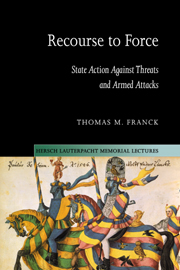Book contents
- Frontmatter
- Contents
- Acknowledgments
- 1 The United Nations' capacity for adapting to radical changes of circumstance
- 2 Use of force by the United Nations
- 3 The original parameters of self-defense
- 4 Self-defence against state-sponsored terrorists and infiltrators
- 5 Self-defense against ideological subversion
- 6 Self-defense against attacks on citizens abroad
- 7 Anticipatory self-defense
- 8 Countermeasures and self-help
- 9 The “purely humanitarian” intervention
- 10 What, eat the cabin boy? Uses of force that are illegal but justifiable
- Index
9 - The “purely humanitarian” intervention
Published online by Cambridge University Press: 17 July 2009
- Frontmatter
- Contents
- Acknowledgments
- 1 The United Nations' capacity for adapting to radical changes of circumstance
- 2 Use of force by the United Nations
- 3 The original parameters of self-defense
- 4 Self-defence against state-sponsored terrorists and infiltrators
- 5 Self-defense against ideological subversion
- 6 Self-defense against attacks on citizens abroad
- 7 Anticipatory self-defense
- 8 Countermeasures and self-help
- 9 The “purely humanitarian” intervention
- 10 What, eat the cabin boy? Uses of force that are illegal but justifiable
- Index
Summary
[W]hile there may be reason to support vigilante justice in some lawless situations, this is a far cry from conceding that sheriff's badges should be handed out to any right-minded person with a gun.
Simon Chesterman Just War or Just Peace? 56 (2001)Necessity is the mother of intervention.
Devika Hovell Research Paper (2000, unpublished)Definition
When a government turns viciously against its own people, what may or should other governments do? The events of the recent past do not permit this to be dismissed as an “academic question.”
If the wrong being perpetrated within a state against a part of its own population is of a kind specifically prohibited by international agreement (e.g. the Genocide Convention and treaties regarding racial discrimination, torture, the rights of women and children, and the International Covenant on Civil and Political Rights, as well as agreements on the humanitarian law applicable in civil conflict), humanitarian intervention against those prohibited acts may be thought of as a subspecies of self-help. This is conceptually more persuasive if the wrongful acts have been characterized explicitly or implicitly by the applicable universal treaties as offenses erga omnes: that is, against any and all states party to the agreement defining and prohibiting the wrong. In such circumstances, it is possible to argue that every state may claim a right of self-help as a vicarious victim of any violation, at least after exhaustion of institutional and diplomatic remedies.
- Type
- Chapter
- Information
- Recourse to ForceState Action against Threats and Armed Attacks, pp. 135 - 173Publisher: Cambridge University PressPrint publication year: 2002
- 1
- Cited by



